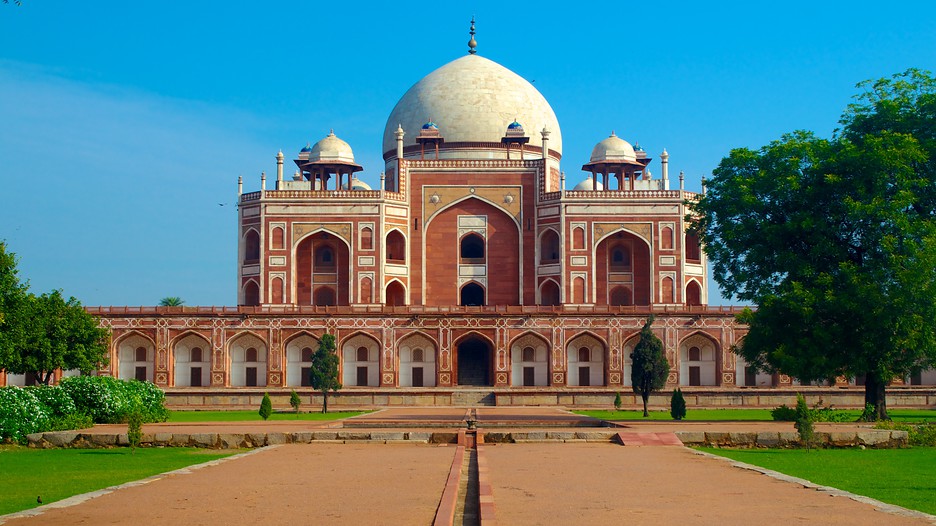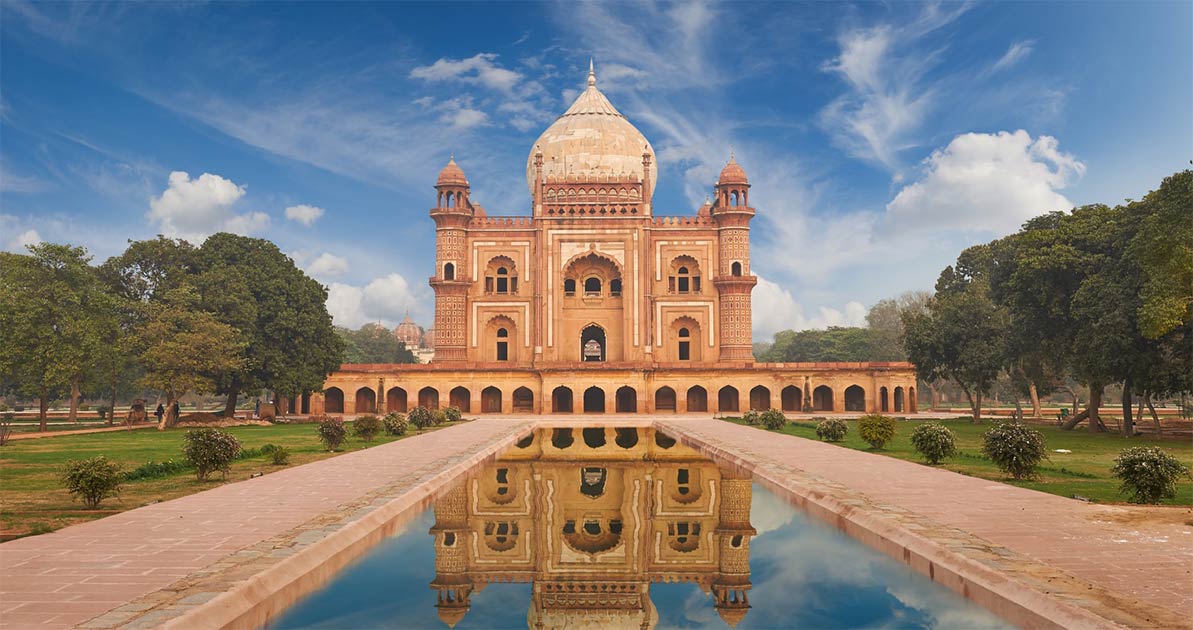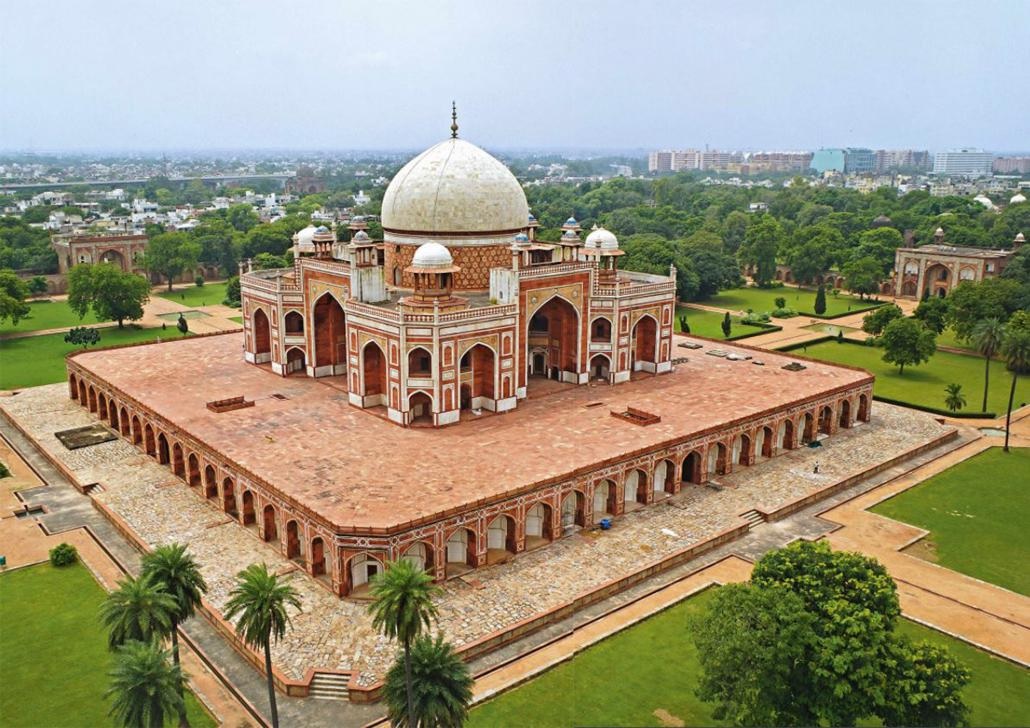
Tomba Del `s Di Humayun. L'India, Delhi Immagine Stock Immagine di
Humayun's Tomb, Delhi is a monumental Mughal garden-tomb complex. This dynastic mausoleum was built in 1570 for Humayun, the second Mughal Emperor of India, and now contains about 150 graves of ruling family members. It uses mainly red sandstone, with white and black marble inlays. It is a landmark in the development of Mughal architecture, as.

Humayun's Tomb New Delhi |Expedia.co.in
Humayun's Tomb is a fine example of a well-planned Mughal Charbagh. The Garden is divided into 4 parts, and each part is further divided into 8 sections. In the center, stands on a square platform, the majestic Humayun's Tomb. Though the structure appears to be a square from a distance, upon closer observation one realizes that the Tomb is.

Humayun's Tomb, the Mughal Mausoleum That Changed India’s Architecture
Explore the expansive grounds, spot rare animals, and enjoy a fun-filled day amidst nature. Entry Fee: ₹40 for adults, ₹20 for children. Working Hours: 9:30 AM to 4:30 PM (Closed on Fridays). Crafts Museum: Delve into India's rich artistic traditions at the Crafts Museum, located a short distance from Humayun's Tomb.

HumayunTomb
Humayun's Tomb, Delhi is the first of the grand dynastic mausoleums that were to become synonyms of Mughal architecture with the architectural style reaching its zenith 80 years later at the later Taj Mahal. Humayun's Tomb stands within a complex of 27.04 ha. that includes other contemporary, 16th century Mughal garden-tombs such as Nila.

La Tomba Di Humayun. Delhi, India Fotografia Stock Immagine di
The Humayun's Tomb is a UNESCO World Heritage Site in Delhi Built for Mughal Emperor Humayun in the year 1570, itis the first grand dynastic garden mausoleum of the subcontinent. The tomb was constructed on the banks of the Yamuna river near the Nizamuddin Dargah. Spread across an area of 30 acres, it offers a panoramic view of the majestic.

Humayun's Tomb
Humayun's tomb ( Persian: Maqbara-i Humayun) is the tomb of Mughal emperor, Mirza Nasir al-Din Muhammad commonly known as Humayun situated in Delhi, India. [1]

Tomba di Humayun Tomba di Humayun La Tomba di Humayun (in … Flickr
Started on 1565, Humayun's Tomb was built by Empress Bega Begum to honor her beloved husband. It was the first of its kind on the Indian subcontinent. Mughal Emperor Humayun ruled over vast territory in Asia from 1530 until he was ousted in 1540. With the aid of the Safavid, the ruling Persian dynasty, he regained his lands in 1556..

Tomba di Humayun Punti di interesse a Delhi con Expedia.it
Brief Synthesis Humayun's Tomb, Delhi is the first of the grand dynastic mausoleums that were to become synonyms of Mughal architecture with the architectural style reaching its zenith 80 years later at the later Taj Mahal.

La Tomba Di Humayun. Delhi, India Immagine Stock Immagine di delhi
Located in the eastern part of Dehli, Humayun's tomb is one of the best preserved Mughal monuments. This spellbinding mausoleum is the first example of Mughal architecture in India. After a century from its construction Humayun's tomb inspired the construction of the more famous Taj Mahal.

29 Ottobre 2014 Vista Laterale Della Tomba Del ` S Di Humayun a Nuova
The Magnificent Humayun's Tomb Is A UNESCO World Heritage Site & Dilli Di Shaan! Delhi Dweller Follow 17 May 2023 Share. Bookmark. One of the most significant historical places that exemplify the rich cultural heritage of Delhi, Humayun's Tomb is a UNESCO World Heritage Site and an architectural structure that inspired the creation style of the.

LA TUMBA DE HUMAYUN... LA OLVIDADA PRECURSORA DEL TAJ MAHAL La Aldea
It was completed in 1572 AD under the patronage of the Mughal Emperor Akbar, the third Mughal ruler and Humayun's son. Located in Nizamuddin, East Dehli, Humayun's tomb or Makbara-e -Humayun is one of the best preserved Mughal monuments and was declared a UNESCO World Heritage site in 1993. Image Credit: askideas.com. History

The Tomb of Humayun, a photo from Delhi, North TrekEarth
La tomba di Humāyūn (in hindi हुमायूँ का मक़बरा, Urdu: ہمایون کا مقبره - Humāyūn kā Maqbara) è un complesso di edifici inerenti alla sepoltura dell'imperatore moghul Humāyūn, commissionato dalla moglie dello stesso, Ḥamīda Bānū Bēgum nel 1562 d.C. e progettato dall'architetto persiano Mirak Mīrzā Ghiyāth. [1]

Humayun's Tomb in Delhi, India. The tomb was declared a UNESCO World
Humayun's tomb ( Maqbaera e Humayun) is the tomb of the Mughal Emperor Humayun in Delhi, India. The tomb was commissioned by Humayun's first wife and chief consort, Empress Bega Begum (also known as Haji Begum), in 1569-70, and designed by Mirak Mirza Ghiyas and his son, Sayyid Muhammad, Persian architects chosen by her.

Pathos of Humayun's tomb, arrest of last Mogul emperor and officer
The first garden-tomb that was constructed in India was the spectacular Tomb of Humayun devoted to the second Mughal Emperor. So magnificent was the monument, that it came to inspire major architectural innovations throughout the Mughal Empire, including the world-renowned Taj Mahal in Agra, built about a century after Humayun's Tomb.

Humayun Tomb Historical Facts and Pictures The History Hub
Humayun's tomb. This tomb, built in 1570, is of particular cultural significance as it was the first garden-tomb on the Indian subcontinent. It inspired several major architectural innovations, culminating in the construction of the Taj Mahal. Cite this page as: UNESCO, "Humayun's tomb," in Smarthistory, June 3, 2021, accessed January 3.

Tomba di Humayun Virtual Tour 360°
English: Humayun's Tomb is a complex of buildings of Mughal architecture located in Nizamuddin east, New Delhi. It encompasses the main tomb of the Emperor Humayun as well as numerous others. The complex is a World Heritage Site and the first example of this type of Mughal architecture in India.